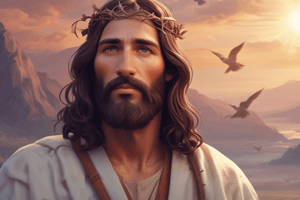Podcast
Questions and Answers
Who did Rav and Shmuel identify as the 'meyaldot ha’Ivriot' and what was their relationship according to each of them?
Who did Rav and Shmuel identify as the 'meyaldot ha’Ivriot' and what was their relationship according to each of them?
Rav identified them as mother and daughter, while Shmuel identified them as mother and daughter-in-law.
What were the meanings behind the names 'Shifra' and 'Pu’ah' according to the text?
What were the meanings behind the names 'Shifra' and 'Pu’ah' according to the text?
Shifra means 'she makes the child shapely' and Pu’ah means 'she purrs, talks, and coos to the child.'
What did Pharaoh command the midwives to do?
What did Pharaoh command the midwives to do?
To kill the Jewish baby boys as soon as they were born
What was their dilemma and which option did they choose?
What was their dilemma and which option did they choose?
What are some key Muslim beliefs?
What are some key Muslim beliefs?
What do Muslims believe about Muhammad?
What do Muslims believe about Muhammad?
Which angel came to speak to Muhammad?
Which angel came to speak to Muhammad?
What similarities between Judaism and Islam can you think of?
What similarities between Judaism and Islam can you think of?
Why did the Jews of Medina not give Muhammad a warm welcome?
Why did the Jews of Medina not give Muhammad a warm welcome?
What was the Pact of Omar?
What was the Pact of Omar?
Flashcards are hidden until you start studying
Study Notes
Midwives in Exodus
- Rav identified the 'meyaldot ha’Ivriot' as Shifra, while Shmuel identified her as Pu’ah; both names refer to the same midwives but imply different roles or meanings.
- According to Rav, Shifra was a wise and skilled midwife, while Shmuel characterized Pu’ah as one who comforted and soothed the newborns.
Names Shifra and Pu’ah
- The name 'Shifra' translates to "to make beautiful," indicating the midwives' role in ensuring the healthy birth of babies.
- 'Pu’ah' means "to cry out," reflecting the midwives' role in comforting the infants during childbirth.
Pharaoh's Command
- Pharaoh commanded the midwives to kill all Hebrew baby boys at birth but allowed baby girls to live.
Dilemma of Midwives
- The midwives faced a moral dilemma: obey Pharaoh's order and murder innocent children or reject his command and risk punishment.
- They chose to defy Pharaoh, saving the boys and lying about their actions, claiming Hebrew women gave birth too quickly for them to intervene.
Key Muslim Beliefs
- Belief in one God (Allah) who is merciful and sovereign over all creation.
- Faith in the prophets, with Muhammad being the final prophet sent to humanity.
- Importance of the Five Pillars of Islam, which include declaration of faith, prayer, almsgiving, fasting, and pilgrimage.
Beliefs about Muhammad
- Muhammad is considered the "Seal of the Prophets" and is revered as the messenger of God's final revelations.
- Muslims believe he received the Qur'an from Allah through the angel Gabriel.
Angel Gabriel
- The angel Gabriel (Jibril) is the celestial being who conveyed God's messages to Muhammad, guiding him in his prophetic mission.
Similarities between Judaism and Islam
- Both religions emphasize monotheism, the worship of a single, omnipotent God.
- They share common prophets, including Abraham, Moses, and others, featured in the sacred texts.
- The practice of dietary laws and rituals, such as prayer and fasting, is significant in both faiths.
Jewish Reception in Medina
- The Jews of Medina were initially hesitant to welcome Muhammad due to their prior expectations of a prophet and concerns about his teachings.
- Some Jewish tribes felt threatened by the shift in power dynamics following Muhammad's arrival.
Pact of Omar
- The Pact of Omar is an agreement outlining the rights and protections granted to non-Muslims (dhimmis) living under Muslim rule.
- It established the conditions for coexistence between Muslims and non-Muslims, emphasizing respect and protection for religious minorities in exchange for a poll tax.
Studying That Suits You
Use AI to generate personalized quizzes and flashcards to suit your learning preferences.




